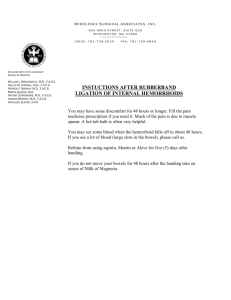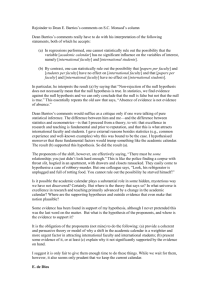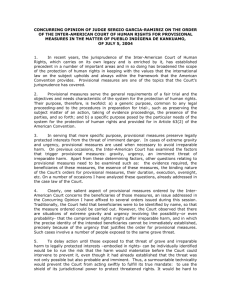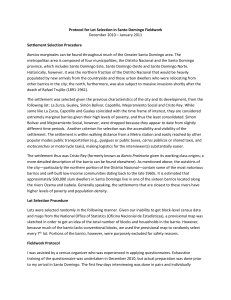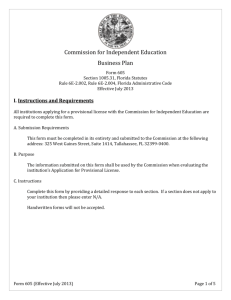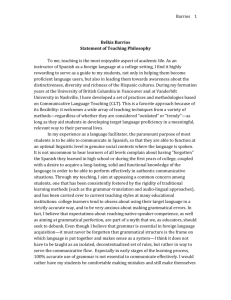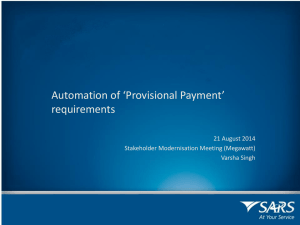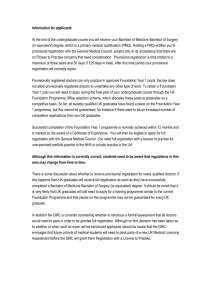ORDER OF THE INTER-AMERICAN COURT OF HUMAN RIGHTS
advertisement
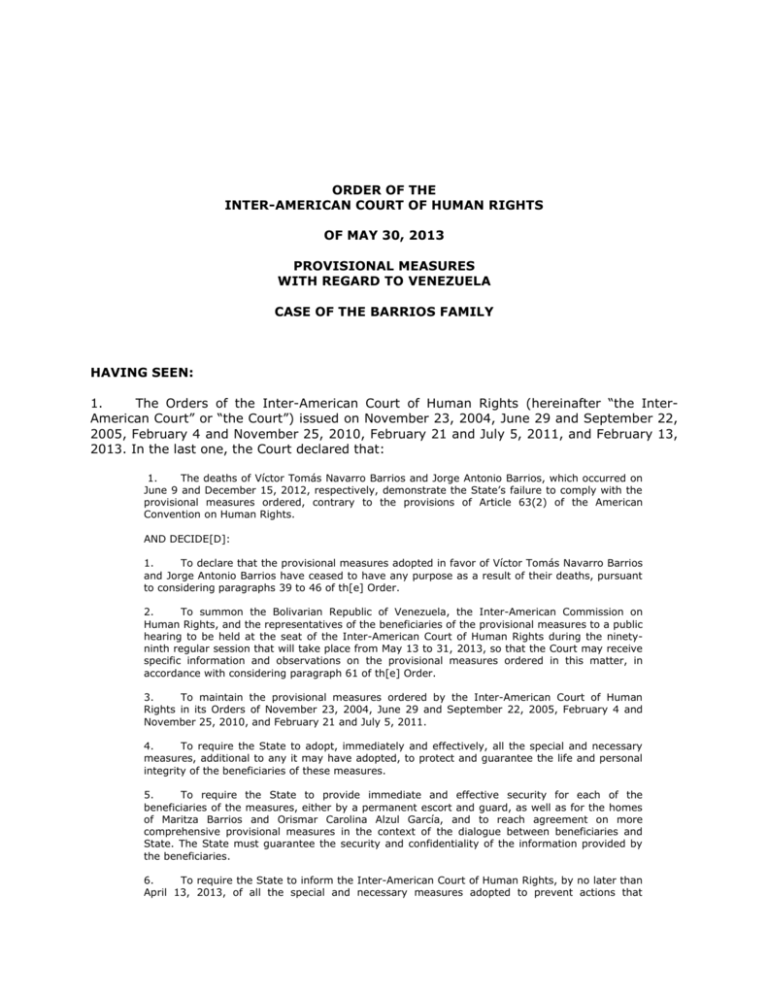
ORDER OF THE INTER-AMERICAN COURT OF HUMAN RIGHTS OF MAY 30, 2013 PROVISIONAL MEASURES WITH REGARD TO VENEZUELA CASE OF THE BARRIOS FAMILY HAVING SEEN: 1. The Orders of the Inter-American Court of Human Rights (hereinafter “the InterAmerican Court” or “the Court”) issued on November 23, 2004, June 29 and September 22, 2005, February 4 and November 25, 2010, February 21 and July 5, 2011, and February 13, 2013. In the last one, the Court declared that: 1. The deaths of Víctor Tomás Navarro Barrios and Jorge Antonio Barrios, which occurred on June 9 and December 15, 2012, respectively, demonstrate the State’s failure to comply with the provisional measures ordered, contrary to the provisions of Article 63(2) of the American Convention on Human Rights. AND DECIDE[D]: 1. To declare that the provisional measures adopted in favor of Víctor Tomás Navarro Barrios and Jorge Antonio Barrios have ceased to have any purpose as a result of their deaths, pursuant to considering paragraphs 39 to 46 of th[e] Order. 2. To summon the Bolivarian Republic of Venezuela, the Inter-American Commission on Human Rights, and the representatives of the beneficiaries of the provisional measures to a public hearing to be held at the seat of the Inter-American Court of Human Rights during the ninetyninth regular session that will take place from May 13 to 31, 2013, so that the Court may receive specific information and observations on the provisional measures ordered in this matter, in accordance with considering paragraph 61 of th[e] Order. 3. To maintain the provisional measures ordered by the Inter-American Court of Human Rights in its Orders of November 23, 2004, June 29 and September 22, 2005, February 4 and November 25, 2010, and February 21 and July 5, 2011. 4. To require the State to adopt, immediately and effectively, all the special and necessary measures, additional to any it may have adopted, to protect and guarantee the life and personal integrity of the beneficiaries of these measures. 5. To require the State to provide immediate and effective security for each of the beneficiaries of the measures, either by a permanent escort and guard, as well as for the homes of Maritza Barrios and Orismar Carolina Alzul García, and to reach agreement on more comprehensive provisional measures in the context of the dialogue between beneficiaries and State. The State must guarantee the security and confidentiality of the information provided by the beneficiaries. 6. To require the State to inform the Inter-American Court of Human Rights, by no later than April 13, 2013, of all the special and necessary measures adopted to prevent actions that threaten the life or the personal integrity of the beneficiaries of these provisional measures, and to include the information requested in [the said] Order. Furthermore, the said report must contain a risk assessment for each beneficiary, as well as the definition of specific, adequate and sufficient measures and means of protection for each of them. 7. To reiterate to the State that it must continue reporting to the Inter-American Court of Human Rights every two months on the provisional measures adopted, and to require the beneficiaries of these measures or their representatives to submit their observations within four weeks of notification of the reports of the State, and the Inter-American Commission on Human Rights to present its observations on these reports of the State within six weeks of receiving them. 2. The notes of the Secretariat of the Court (hereinafter “the Secretariat”) of April 15, 2013, advising that “the public hearing convened in the […] second operative paragraph of the Order of February 13, 2013, w[ould] be held on May 29, 2013.” 3. The communications of April 15 and 26, 2013, in which the State twice requested extensions of the time frame to present the report required in the Order of the Court of February 13, 2013. 4. The notes of the Secretariat of April 12 and 30, 2013, granting the extensions requested by the State. 5. The communications of May 19 and 21, 2013, in which the Inter-American Commission on Human Rights (hereinafter “the Inter-American Commission” or “the Commission”) and the representatives of the beneficiaries (hereinafter “the representatives”) informed the Court of the presumed murder of Roni David Barrios Alzul,1 beneficiary of these provisional measures. 6. The notes of the Secretariat of May 21, 2013, in which the President of the Court (hereinafter also “the President”) asked the State to present information on the presumed murder of the said beneficiary, as well as on the measures adopted in this regard, at the public hearing of May 29, 2013. The President also advised the representatives that they could present any pertinent information or observations during this hearing. 7. The arguments of the parties and of the Commission during the public hearing on these provisional measures held at the seat of the Court on May 29, 2013.2 CONSIDERING THAT: 1. Venezuela has been a State Party to the American Convention on Human Rights (hereinafter “the American Convention” or “the Convention”) since August 9, 1977, and accepted the contentious jurisdiction of the Court on June 24, 1981. In its brief, the Commission referred to the death of “Roniel David Barrios Alzul.” For their part, the representatives referred to the death of “Roni David Barrios Alzul,” while, in the annexes presented, he is identified as “Ronis David Barrios Alzul.” Based on the information provided during the public hearing, the Court understands that the correct name of the deceased beneficiary is “Roni David Barrios Alzul”. 1 There appeared at this hearing: for the Inter-American Commission on Human Rights: Elizabeth AbiMershed, Deputy Executive Secretary, and Silvia Serrano Guzmán, Adviser; in representation of the beneficiaries: Eloisa Barrios, beneficiary; Luis Aguilera, Commission from Aragua state, and Francisco Quintana, CEJIL, and for the State of Venezuela: Germán Saltrón Negretti, State Agent for Human Rights before the Inter-American and International System , and Nestor Luís Castellano Molero, Fourth Prosecutor of the Public Prosecution Service before the Cassation Chambers and the Constitutional Chamber of the Supreme Court of Justice. 2 2 2. The Court has indicated that provisional measures have a preventive nature insofar as they preserve a legal situation, but they also have a fundamentally protective nature, because they protect human rights by avoiding irreparable damage to persons.3 Regarding the preventive nature, the object and purpose of the measures is to preserve the rights that are possibly at risk until the dispute has been decided. They seek to ensure the integrity and effectiveness of the decision on merits in order to avoid any harm to the rights in litigation, a situation that could annul the practical effects of the final decision. Provisional measures enable the State involved in the litigation to comply with the final decision and, if applicable, with the reparations ordered.4 3. Similarly, the provisions of Article 63(2) of the Convention signify that the State is obliged to adopt the provisional measures ordered by this Court, because, pursuant to a basic principle of international law, States must comply with their obligations in good faith (pacta sunt servanda). Failure to comply with an order to adopt provisional measures issued by the Court during the proceedings before the Commission and before the Court may give rise to the State’s international responsibility.5 4. In the context of provisional measures, the Court may only consider arguments that are directly and strictly related to the situation of extreme gravity, necessity, and urgency of avoiding irreparable damage that determined their adoption or if new equally serious and urgent acts justify maintaining them. Any other matter, which is not related to this situation, may only be submitted to the Court’s consideration in a contentious case. 6 5. According to the Orders of the Inter-American Court of November 23, 2004, June 29, and September 22, 2005, February 4 and November 25, 2010, February 21 and July 5, 2011, and February 13, 2013 (supra having seen paragraph 1), the State must, inter alia, protect the life and personal integrity of the beneficiaries.7 In addition, in the Order of February 13, 2013, the State was required to adopt, immediately and effectively, all the special and necessary measures, additional to those already adopted, in order to protect and guarantee the life and personal integrity of the beneficiaries, so as to eliminate the sources of danger and to avoid the death of another beneficiary.8 Thus, the State was ordered to conduct a comprehensive risk assessment of each of the beneficiaries, and to provide the Court with complete and detailed information on the results, with the substantiating documentation, as well as on the measures and means of specific, adequate Cf. Case of the “La Nación” Newspaper. Provisional measures with regard to Costa Rica. Order of the Court of September 7, 2001, fourth considering paragraph, and Case of the Barrios Family. Provisional measures with regard to Venezuela. Order of the Court of February 13, 2013, second considering paragraph. 3 Cf. Matter of the Judicial Detention Center El Rodeo II. Provisional measures with regard to Venezuela. Order of the Court of February 8, 2008, seventh considering paragraph, and Case of the Barrios Family. Provisional measures with regard to Venezuela. Order of the Court of February 13, 2013, second considering paragraph. 4 Cf. Case of the Communities of Jiguamiandó and of the Curbaradó. Provisional measures with regard to Colombia. Order of the Court of February 7, 2006, seventh considering paragraph, and Case of the Barrios Family. Provisional measures with regard to Venezuela. Order of the Court of February 13, 2013, third considering paragraph. 5 Cf. Matter of James et al. Provisional measures with regard to Trinidad and Tobago. Order of the Court of August 29, 1998, sixth considering paragraph, and Matter of Alvarado Reyes et al. Provisional measures with regard to Mexico. Order of the Court of November 23, 2012, fourth considering paragraph. 6 The following persons are beneficiaries of these measures: Eloisa Barrios, Inés Barrios, Beatriz Barrios, Orismar Carolina Alzul García, Pablo Solórzano, Néstor Caudí Barrios, Maritza Barrios, Roni Barrios, Roniel Barrios, Luis Alberto Barrios, Yelitza Lugo Pelaes, Arianna Nazaret Barrios, Oriana Zabaret Barrios, Víctor Cabrera Barrios, Beatriz Cabrera Barrios, Luimari Guzmán Barrios, Luiseydi Guzmán Barrios, Génesis Andreina Barrios, Geilin Alexandra Barrios, Elvira Barrios, Darelvis Barrios, Elvis Sarais Barrios, Cirilo Robert Barrios and Lorena Barrios. 7 Cf. Case of the Barrios Family. Provisional measures with regard to Venezuela. Order of the Court of February 13, 2013, fifty-second considering paragraph. 8 3 and sufficient protection implemented as a result of these assessments.9 Furthermore, the State was ordered to provide immediate and effective security measures for each beneficiary of the measures, either by a permanent escort and guard, and also of the homes of Maritza Barrios and Orismar Carolina Alzul García, and to reach agreement on more comprehensive provisional measures in the context of the dialogue between the beneficiaries and the State, including the necessary measures to provide effective protection to them during their displacements and movements within and outside the area where they live.10 6. In the last Order, the Court asked the State to present a report on compliance with the orders previously mentioned by April 13, 2013. The State did not present the report on the said date and requested two extensions in order to present it (supra third having seen paragraph). Nevertheless, at the time of the public hearing on May 29, 2013, the State had not presented the information required in the last Order. 7. On May 19 and 21, 2013, the Commission and the representatives, respectively, informed the Court of the murder of Roni David Barrios Alzul, beneficiary of these measures, on May 15, 2013, in the circumstances described below. Owing to this fact, and taking into account the need to receive more detailed information on other aspects of the implementation of these provisional measures, in this Order, the Court will only examine the information received before and during the public hearing on the death of the beneficiary Roni David Barrios Alzul. The other aspects relating to the implementation of the provisional measures will be evaluated by the Court on another occasion, once the Court has received the information requested from the State and the representatives during the abovementioned public hearing. Regarding the facts relating to the death of Roni Barrios Alzul 8. The Inter-American Commission informed the Court that, on May 15 this year, “Ron[i] David Barrios Alzul, beneficiary of the present provisional measures, had been murdered […] as a result of numerous injuries from a sharp instrument, in Guanayén, Aragua state.” It underscored that Roni Barrios Alzul was “the tenth member of the Barrios family to be murdered.” The Commission expressed its “profound concern with regard to this fact and reiterate[d] what it had indicated on numerous occasions concerning the State’s failure to comply with the provisional measures.” In addition, it emphasized that “the State had not adopted any measure to protect him.” It stressed that the State had “not even planned to conduct a risk assessment of each person or family group.” It also emphasized that, as a result of this and the absence of a protection strategy, “the only measure established by the State has been the visit to the homes of the family groups by the National Guard,” whereas “the death of eight beneficiaries of measures of protection of the Commission and of the Court reveals that this measures is neither sufficient or effective.” 9. The representatives indicated that, on Wednesday, May 15, Roni Barrios Alzul, 17 years of age, was “at the home of his mother, Orismar Carolina Alzul García, in the Las Casitas sector of the village of Guanayén, until 6 p.m. Then, […] he went to sleep at the home of his aunt, Eloisa Barrios, located in the same sector,” which was uninhabited. The following day, “at 6 a.m., his brother Roniel, who is 12 years old, was walking towards a Cf. Case of the Barrios Family. Provisional measures with regard to Venezuela. Order of the Court of February 13, 2013, fifty-fourth considering paragraph. 9 Cf. Case of the Barrios Family. Provisional measures with regard to Venezuela. Order of the Court of February 13, 2013, fifty-third considering paragraph. 10 4 farm in the La Oficina sector, bordering the Las Casitas sector, [and b]efore he reached his destination, he found the lifeless body of his brother, Roni, on the ground, with at least four wounds to his head produced by a sharp instrument.” According to officials from the Investigations Unit, “[t]he said injuries were possibly caused by an axe.” According to his next of kin, the corpse of Roni Barrios “was wearing different clothes from those he wore when he left his mother,” and his aunt’s house “revealed no signs of violence, traces of blood or damage to the outer doors”; furthermore, “there were scratches on the back of the body and bruising on the face, which allows it to be supposed that he was ill-treated and that his body was dragged to the place where it was abandoned.” On May 16, “a group from the Villa de Cura, Aragua state, branch of the Scientific, Criminal and Criminalistics Unit arrived to remove the body,” which was taken to the morgue in order to perform the required autopsy. The representatives underscored that Roni David Barrios “had witnessed the death of […] his father,” Luis Alberto Barrios, “who was also murdered in a violent manner,” as well as “the search of, and the setting fire to, his home in 2004. In addition, they indicated that “as this regrettable event reveals,” the measures ordered by the Court in the Order of February 13, 2013, “were not reactivated and, consequently, were not effective to protect the members of the Barrios family who remain in Guanayén.” 10. The State advised that, “on May 15, 2013, in Aragua state, specifically in the district known as Oficina, Paso de Cura sector, […] the body of the adolescent [Roni David Barrios Alzul] was found with injuries produced by a sharp instrument, as reported in the required autopsy performed by the forensic physicians called upon for this purpose.” In addition, it indicated that “the Public Prosecution Service appointed the sixteenth prosecutor of the Public Prosecution Service of Aragua state specialized in violence suffered by children and adolescents, […] who is currently taking all the necessary investigative measures to be able to determine the identity of the perpetrators of these facts and whether they belong to the ranks of any security and public order agency of the Venezuelan State.” In addition, it alleged that “Roni David Barrios Alzul […] was inside his home and was six years old [when his father died], so that it is false that, now, his death should be considered a reprisal in order to avoid the trial of those who took part in the facts of his father’s death.” Lastly, the State underlined that Roni Barrios Alzul’s mother had renounced the measures of protection granted at the domestic level, which covered her family group, and had not attended the hearing on implementation of the said measures held on May 13, 2013. Considerations of the Court 11. The Court notes with concern that the death of Roni Barrios Alzul, who was 17 years old, constitutes the tenth murder of a member of the Barrios family, seven of which have taken place while these provisional measures have been in force and one while the preventive measures granted by the Inter-American Commission were in force: Luis Alberto Barrios, on September 20, 2004; Rigoberto Barrios, between January 19 and 20, 2005; Oscar Barrios, on November 29, 2009; Wilmer José Flores Barrios, on September 1, 2010; Juan José Barrios, on May 28, 2011, Víctor Tomás Navarro Barrios, on June 9, 2012, Jorge Antonio Barrios, on December 15, 2012, and recently Roni Barrios Alzul, on May 15, 2013.11 In the Judgment handed down by the Court in this case it was established that Benito Antonio Barrios and Narciso Barrios had been deprived of their life by State agents in 1998 and 2003, respectively, and this was not contested by the State. Consequently, the Court determined the State’s international responsibility for the violation of the right to life contained in Article 4(1) of the American Convention, in relation to Article 1(1) thereof, to the detriment of Benito Antonio Barrios and Narciso Barrios. Furthermore, the Court established that “[e]ven though there [wa]s still no official version of the facts, the evidence in the case file allow[ed] the Court to conclude that police officials took part in the attack that resulted in the death of Rigoberto Barrios, and that the victim underwent suffering from the moment of the attempt on his life until his death as a result of the gunshots he received and of the consequent fear of dying or suffering permanent injuries.” Therefore, the Court determined that Venezuela had violated Articles 4(1) and 5(1), in relation to Article 1(1) of the Convention, to the detriment of Rigoberto Barrios. Cf. 11 5 In addition, in January 2011, an attempt was made on the life of Néstor Caudi Barrios, another beneficiary protected by the provisional measures. The Court reiterates that all this represents grave non-compliance by the State with the provisions of Article 63(2) of the American Convention. 12. The Court takes note of the initiation of investigative activities with regard to the death of the beneficiary Roni Barrios Alzul, according to information provided by the State during the public hearing. However, in notes that Venezuela has not provided any information on the measures it may have adopted to prevent the said fact or on the measures of protection it had adopted in favor of the said beneficiary in order to protect his life and personal integrity in view of the danger that another act such as this one might occur. The Court recalls that compliance with the provisional measures depends on the effective implementation of measures of protection in favor of the beneficiaries, so that the danger ceases for the persons whose protection is sought.12 In this regard, it notes that, as at the time of the murders of Jorge Antonio Barrios and Víctor Tomás Navarro Barrios,13 the State has merely presented information on the investigative measures that have been initiated, without providing detailed information on the measures of protection that it had adopted or would adopt within the framework of these provisional measures to prevent this type of act from continuing to occur. 13. In this regard, the Court recalls that, according to information provided by the State, during a hearing held at the domestic level on March 7, 2012, it was agreed to end the measures of protection in favor of Orismar Carolina Alzul and her respective family group, which presumably included her son, Roni Barrios Alzul, also a beneficiary of these measures.14 After evaluating the situation based on which it was agreed to end these measures, the Court considered it necessary to maintain the provisional measures in favor of Orismar Carolina Alzul, and ordered the State to re-establish the measures of protection that were required to protect her life and personal integrity, and to provide the Court with information in this regard.15 This stipulation was additional and complementary to the Case of the Barrios Family v. Venezuela. Merits, reparations and costs. Judgment of November 24, 2011. Series C No. 237, paras. 64, 68, 95 and 96. Cf. Matter of Juan Almonte Herrera et al. Provisional measures with regard to Dominican Republic. Order of the President of the Court of March 24, 2010, sixteenth considering paragraph, and Case of the Barrios Family. Provisional measures with regard to Venezuela. Order of the Court of February 13, 2013, fortieth considering paragraph. 12 Cf. Case of the Barrios Family. Provisional measures with regard to Venezuela. Order of the Court of February 13, 2013, thirty-second considering paragraph. 13 Cf. Case of the Barrios Family. Provisional measures with regard to Venezuela. Order of the Court of February 13, 2013, seventh considering paragraph. 14 According to the information provided by the State, the termination of the measures of protection in favor of Orismar Carolina Alzul was decided owing to a supposed rejection of these measures by the beneficiary herself. Based on this alleged renunciation, the State requested that the provisional measures in favor of the said beneficiary be lifted. The Court decided this request in its Order of February 13, 2013. In this regard, in the said Order, the Court decided not to lift the measures granted in favor of this beneficiary based on a sworn statement in which Orismar Carolina Alzul “refute[d] the content of the document presented by the Public Prosecution Service,” according to which she had refused the measures. As decided in the said Order, this sworn statement was sufficient evidence prima facie to doubt the alleged rejection of the provisional measures granted by this Court. In addition, the Court emphasized that, in a situation such as the one that exists in this case, it is essential that the State and the representatives adopt the necessary measures to ensure that a rejection of the measures of protection constitutes a duly informed decision, which would appear not to have been the case when the State interviewed the beneficiary and she supposedly rejected them. Therefore, in view of the characteristics of the danger to which the beneficiaries of these provisional measures have been exposed and the fact that the State has not conducted or provided the objective risk assessment studies of the beneficiary (which the Court has been asking the State to provide since 2010), the Court did not find it admissible to lift the provisional measures granted in favor of Orismar Carolina Alzul. Cf. Case of the Barrios Family. 15 6 general decision requiring the State to adopt all special and necessary measures, additional to any it had adopted, to protect and guarantee the life and person integrity of all the beneficiaries (supra considering paragraph 5). During the hearing, the State confirmed that Roni Barrios Alzul formed part of Orismar Carolina Alzul’s family group regarding whom the termination of the measures of protection had been decided at the domestic level. However, even though, in the Order of February 2013, the State was specifically asked to provide information on the re-establishment of the said measures of protection, the Court has not received any information in this regard. 16 Consequently, the Court has no information that would allow it to determine whether, at the time of Roni Barrios Alzul’s murder, the State had adopted all the necessary measures to provide effective protection to the life and integrity of this beneficiary. 14. The Court recalls that, in the Judgment handed down in this case, it concluded that the State had “failed to comply with the obligation of protection and prevention with regard to five beneficiaries of measures of protection ordered by the organs of the inter-American system” who had been murdered or who had suffered attempts on their life, despite the fact that preventive or provisional measures were in force. 17 Furthermore, the Court determined that “the State was fully aware of the danger faced by the said members of the Barrios family, due both to the effect of the denunciations and measures of protection requested and ordered at the domestic level, and in view of the preventive and provisional measures ordered by the organs of the inter-American system.”18 15. The Court underlines that the death of Roni Barrios Alzul occurred despite this ruling by the Court in its Judgment on merits, as well as the Court’s reiterated orders that the State protect the life and integrity of the beneficiaries, especially and specifically by the Orders on provisional measures issued in this case (supra first having seen paragraph). The murder of another beneficiary of these provisional measures is an extremely serious fact that, added to the absence of information on the adoption of measures of protection, denotes the failure to implement the provisional measures effectively. The Court reiterates that, although Article 1(1) of the Convention establishes the general obligation of the States Parties to respect the rights and freedoms recognized therein and to ensure their free and full exercise to all those subject to their jurisdiction, when any individual under their jurisdiction is a beneficiary of provisional measures, this general obligation is enhanced in their regard and, thus, special care must be given to providing this protection. 19 Noncompliance with the measures may give rise to the international responsibility of the State.20 Provisional measures with regard to Venezuela. Order of the Court of February 13, 2013, considering thirteenth to seventeenth paragraphs. Cf. Case of the Barrios Family. Provisional measures with regard to Venezuela. Order of the Court of February 13, 2013, seventeenth considering paragraph. 16 In particular, Luis Alberto Barrios, Oscar José Barrios, Wilmer José Flores Barrios, Néstor Caudi Barrios and Juan José Barrios. Cf. Case of the Barrios Family v. Venezuela. Merits, reparations and costs. Judgment of November 24, 2011. Series C No. 237, paras. 124 and 313. 17 Case of the Barrios Family v. Venezuela. Merits, reparations and costs. Judgment of November 24, 2011. Series C No. 237, para. 124. 18 Cf. Case of Velásquez Rodríguez. Provisional measures with regard to Honduras. Order of the Court of January 15, 1988, third considering paragraph , and Case of the Barrios Family. Provisional measures with regard to Venezuela. Order of the Court of February 13, 2013, forty-fifth considering paragraph. 19 Cf. Case of Hillaire, Constantine and Benjamin et al. v. Trinidad and Tobago. Merits, reparations and costs. Judgment of June 21, 2002. Series C No. 94, paras. 196 to 200, and Case of the Barrios Family. Provisional measures with regard to Venezuela. Order of the Court of February 13, 2013, forty-fifth considering paragraph. 20 7 16. The Court finds it pertinent to clarify that a ruling of this Court concerning noncompliance with the provisional measures, owing to the absence of effective protection for a beneficiary, does not constitute an attribution of responsibility to the State for the possible participation of State agents in the said murders. In the context of a proceeding on provisional measures, it is not incumbent on this Court to determine the possible participation of State agents in the said events; but rather it must monitor and assess effective compliance with the provisional measures ordered by the Court, based on a situation of extreme gravity and urgency to prevent irreparable damage to persons. In addition, the Court emphasizes that, in order to ensure that the rights recognized in the American Convention are effective, the State Party has the obligation, erga omnes, to protect all those who are subject to its jurisdiction, including in relation to the actions of private third parties or illegal armed groups of any nature.21 17. Owing to the seriousness of the situation in which the beneficiaries find themselves, which is demonstrated by the death of three beneficiaries over the past year, the Court reiterates that the State must adopt immediately, and effectively, adequate and special measures to protect and to guarantee the life and personal integrity of all the beneficiaries of these measures, in keeping with the provisions of the Orders issued by the Court on November 23, 2004, June 29 and September 22, 2005, February 4 and November 25, 2010, February 21 and July 5, 2011, and February 13, 2013, so as to eliminate the sources of danger, avoid the repetition of acts such as those described, and that the beneficiaries may live their normal lives without fear. THEREFORE: THE INTER-AMERICAN COURT OF HUMAN RIGHTS, in exercise of its authority under Articles 63(2) of the American Convention on Human Rights and 27 and 31 of the Rules of Procedure of the Court, DECLARES THAT: 1. The death of Roni David Barrios Alzul, which occurred on May 15, 2013, added to the absence of information on the adoption of measures of protection, reveals non-compliance by the State with the provisional measures ordered, contrary to the provisions of Article 63(2) of the American Convention on Human Rights. AND DECIDES: 1. To declare that the provisional measures adopted in favor of Roni David Barrios Alzul no longer have a purpose owing to his decease, as indicated in considering paragraphs 11 to 16 of this Order. 2. To maintain the provisional measures ordered by the Inter-American Court of Human Rights in its Orders of November 23, 2004, June 29 and September 22, 2005, February 4 and November 25, 2010, February 21 and July 5, 2011, and February 13, 2013. Cf. Matter of the Peace Community of San José de Apartadó. Provisional measures with regard to Colombia. Order of the Court of June 18, 2002, eleventh considering paragraph, and Case of the Barrios Family. Provisional measures with regard to Venezuela. Order of the Court of February 13, 2013, fifty-first considering paragraph. 21 8 3. To reiterate to the State that it must adopt, immediately and effectively, all the special and necessary measures, in addition to those it may have already adopted, to protect and guarantee the life and personal integrity of the beneficiaries of these measures, as established in considering paragraphs 17, 30, 50 to 56 of the Order of the Court of February 13, 2013. The State must guarantee the security and confidentiality of the information provided by the beneficiaries for the implementation of these measures. 4. To require the State to inform the Inter-American Court of Human Rights, by June 24, 2013, at the latest, of the special and necessary measures adopted to ensure that no acts occur that constitute an attack on the life or personal integrity of the beneficiaries of these provisional measures, and also to submit the information requested during the public hearing held on May 29, 2013, as indicated in considering paragraph 7 of this Order. 5. To reiterate to the State that, following the report required in the preceding operative paragraph, it should continue to inform the Inter-American Court of Human Rights every two months on the provisional measures adopted, and to require the representatives of the beneficiaries to present their observations within four week of being notified of the State’s reports, and the Inter-American Commission on Human Rights to present its observations of these reports of the State within six weeks of receiving them. 6. To require the Secretariat of the Court to notify this Order to the Bolivarian Republic of Venezuela, the representatives of the beneficiaries, and the Inter-American Commission on Human Rights. Judge Eduardo Vio Grossi advised the Court of his Separate Opinion, which accompanies this Order. Diego García-Sayán President Manuel E. Ventura Robles Alberto Pérez Pérez Eduardo Vio Grossi Roberto de Figueiredo Caldas Humberto Antonio Sierra Porto Eduardo Ferrer Mac-Gregor Poisot Pablo Saavedra Alessandri Secretary 9 So ordered, Diego García-Sayán President Pablo Saavedra Alessandri Secretary 10 SEPARATE OPINION OF JUDGE EDUARDO VIO GROSSI ORDER OF THE INTER-AMERICAN COURT OF HUMAN RIGHTS OF MAY 30, 2013 PROVISIONAL MEASURES WITH REGARD TO VENEZUELA CASE OF THE BARRIOS FAMILY With this separate opinion, the undersigned concurs with the adoption of the Order indicated above, reiterating, however, that, since in this case the judgment has been delivered that is “final and not subject to appeal,”1 which has effectively concluded the instant case, this has precluded the competence of the Inter-American Court of Human Rights (hereinafter “the Court”) to order provisional measures relating or connected to it and, hereafter, it only correspond to the Court “to monitor” compliance with the said Judgment.2 In this regard, and if it is considered that the provisional measures ordered while the Court was “hearing” the case3 should continue following the said Judgment, what would have consequently been appropriate was to establish in the Judgment that the obligation of the State concerned to guarantee that “the injured party be ensured the enjoyment of his right or freedom that was violated”4 entailed the obligation to adopt the pertinent measures in order “to avoid irreparable damage to [the] persons”5 concerned in the case that had been decided and was no longer submitted to its consideration. In this way, the said measures would have been incorporated into the judgment that was “final and not subject to appeal,” so that they would not only share its obligatory nature, but also compliance with them could have been monitored as part of the judgment, and not, consequently, as if the latter had definitively concluded the case, or as if this was a different and even autonomous proceeding. 1 Article 67 of the American Convention on Human Rights. 2 Article 69 of the Rules of Procedure of the Inter-American Court of Human Rights. See Concurring opinions of the undersigned to the Orders on compliance with judgment in the cases of Blanco Romero et al. v. Venezuela; Servellón Garcìa et al. v. Honduras, and Saramaka People v. Suriname, of November 2011. 3 Articles 61(2) and 62(3) of the Convention and 27(1) and 3 of the Court’s Rules of Procedure. 4 Article 63(1) of the Convention. 5 Article 63(2), idem. The more detailed grounds for this position can be found in both the Dissenting Opinions that the undersigned issued on July 15, 2011, with regard to the Orders of the Court relating to “Provisional measures with regard to the Republic of Colombia, Case of Gutiérrez Soler v. Colombia” of June 30, 2011; “Provisional measures with regard to the United Mexican States, Case of Rosendo Cantú et al. v. Mexico” of July 1, 2011, and “Provisional measures with regard to the Republic of Honduras, Case of Kawas Fernández v. Honduras” of July 5, 2011, and in the Record of Complaint brief that, in relation to the same Orders, I submitted to the Court on August 17, 2011. Eduardo Vio Grossi Pablo Saavedra Alessandri Secretary 2
